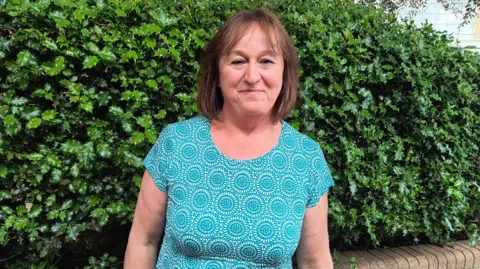Nurse’s 40 years in cancer care a ‘privilege’
 BBC
BBCA cancer specialist nurse who lost her father to the disease is continuing to support patients after her retirement from the wards.
Tricia Timms is a Macmillan call centre nurse based in Portishead, Somerset, who began her career in 1985 at Southmead Hospital and Weston General Hospital.
Facing retirement three years ago, she chose to provide reassurance and a listening ear to those feeling "petrified and in shock" following a cancer diagnosis.
"There's something special about being with somebody at their darkest hour," she said. "You've made a difference, and that's where the reward is. It's a privilege."
Ms Timms' father died from prostate cancer, which had developed to his liver, just six months after she began her job as a prostate cancer nurse.
"It was quite early in my career when I got this passion for cancer care," she explained.
"I wanted to see if we could stop somebody else having to suffer like that. With any cancer, it's about finding it early and you've got a much better chance."
 Getty Images
Getty ImagesMs Timms now supports people "across the scope" from initial diagnosis to palliative care, in addition to loved ones affected by the news.
"It takes an emotional toll on you, we are humans," she admitted.
"We're all qualified and experienced nurses but no matter what, you don't know what you're going to deal with the next day.
"They might be tearful, angry, absolutely petrified, they don't know what to do.
"It's a lifechanging moment when you walk in there and somebody says 'you've got cancer'."
'Give yourself time'
However, Ms Timms said modern medicine has come a long way, and treatments can "work very well and extend people's lifespans".
"[Patients] might feel like everything is taking a long time to get sorted, but we can explain it to them, what's going on in the background," she said.
"Those scans and biopsies need to be looked at to form a picture before they can come up with a treatment plan.
"Give yourself time to get over that shock. Once you know the plan, things are different.”
Follow BBC Somerset on Facebook and X. Send your story ideas to us on email or via WhatsApp on 0800 313 4630.
